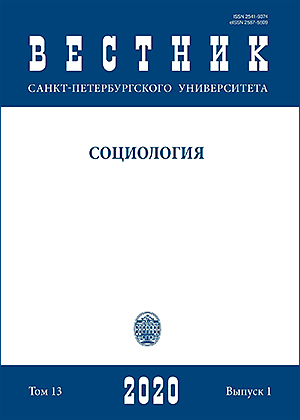Тренды субъективного благополучия в России: 1998–2018
DOI:
https://doi.org/10.21638/spbu12.2020.101Аннотация
Статья посвящена обзору и анализу опросов о субъективном благополучии в России — одном из ключевых неэкономических показателей общественного развития. Сравниваются два основных показателя — уровень счастья и общая удовлетворенность жизнью — по данным восьми международных и российских исследовательских проектов 1998–2018 гг. (European Social Survey, European Values Study, World Values Survey, РМЭЗ НИУ ВШЭ, «Евробарометр в России»; опросы ВЦИОМ, «Левада-центра» и ФОМ). Показано, что основным трендом в этот период являлся последовательный рост субъективного благополучия в 2003–2012 гг., который сменился трендом на снижение удовлетворенности жизнью и одновременно на повышение уровня счастья. Обзор также выявил, что наибольшие расхождения в результатах опросов о субъективном благополучии отмечаются в годы президентских выборов (2008, 2012). Наиболее сильно отличаются от других исследований результаты опросов ВЦИОМ и «Евробарометра в России». Наглядно демонстрируется, как использование шкал без нейтрального варианта ответа систематически завышает оцениваемую долю счастливых и удовлетворенных жизнью респондентов. На основе обобщенных сравнительных данных не выявлено последовательных гендерных различий в уровне благополучия в России, но подтверждается, что доля удовлетворенных жизнью и счастливых людей в России существенно ниже у респондентов старше 35 лет. Динамика субъективного благополучия отражает логику общественных настроений в России. После 2014 г., несмотря на рост патриотических настроений, лишь часть опросов зафиксировала подъем субъективного благополучия, прежде всего — за счет кратковременного повышения уровня счастья. Сложившаяся развилка в результатах опросов свидетельствует о текущем мобилизационном периоде в российском обществе, за которым последует или снижение, или рост обоих показателей.
Ключевые слова:
субъективное благополучие, счастье, удовлетворенность жизнью, сравнительные исследования, Россия, открытые данные
Скачивания
Библиографические ссылки
References
Загрузки
Опубликован
Как цитировать
Выпуск
Раздел
Лицензия
Статьи журнала «Вестник Санкт-Петербургского университета. Социология» находятся в открытом доступе и распространяются в соответствии с условиями Лицензионного Договора с Санкт-Петербургским государственным университетом, который бесплатно предоставляет авторам неограниченное распространение и самостоятельное архивирование.




